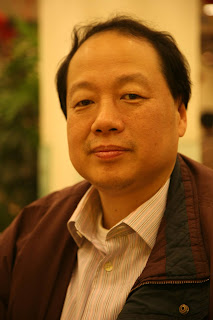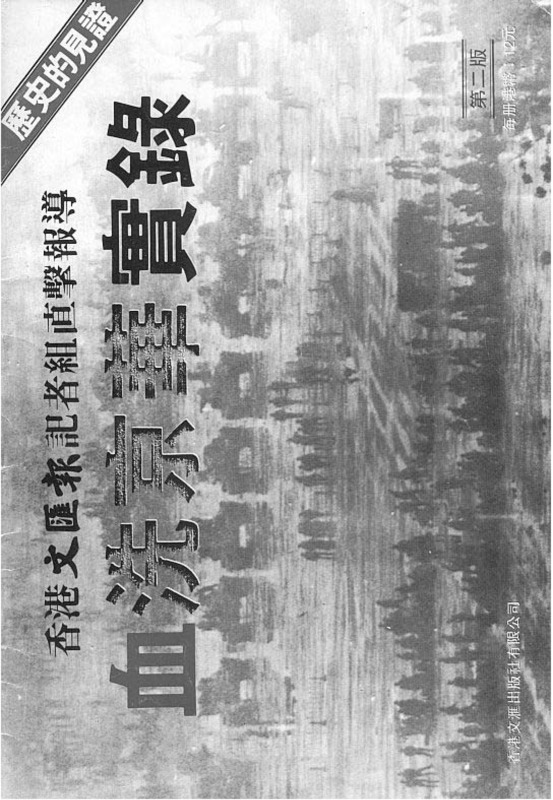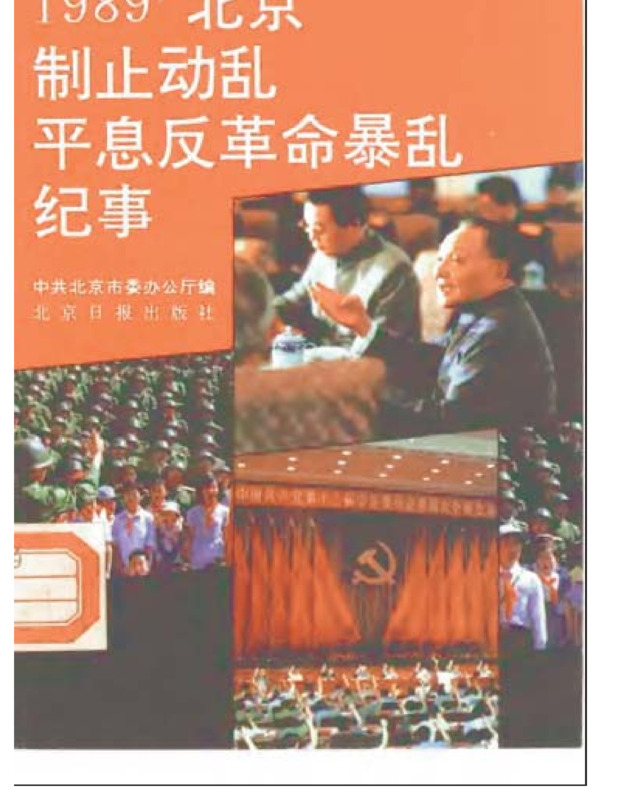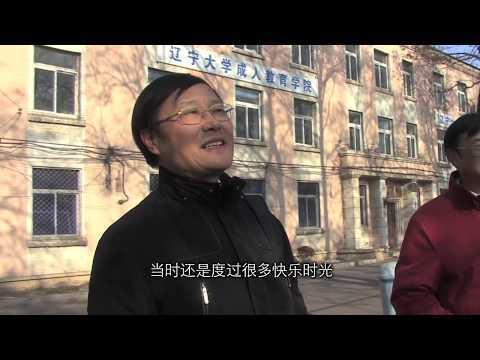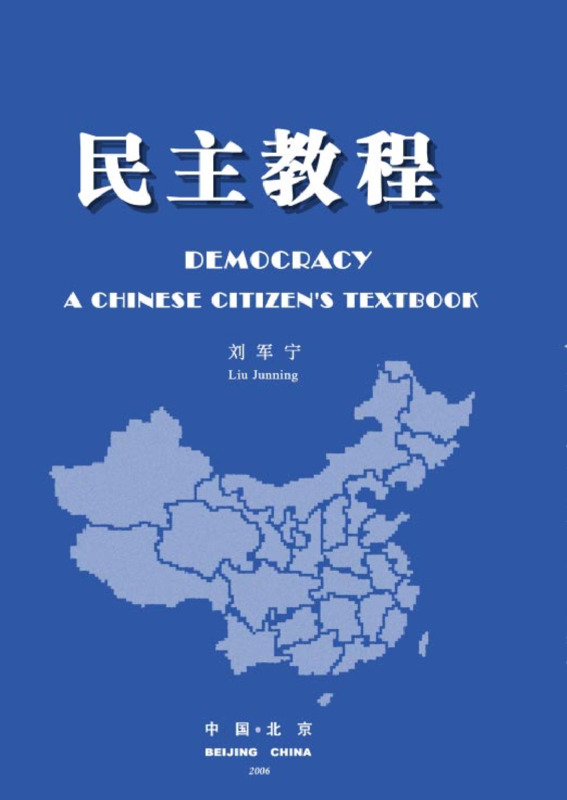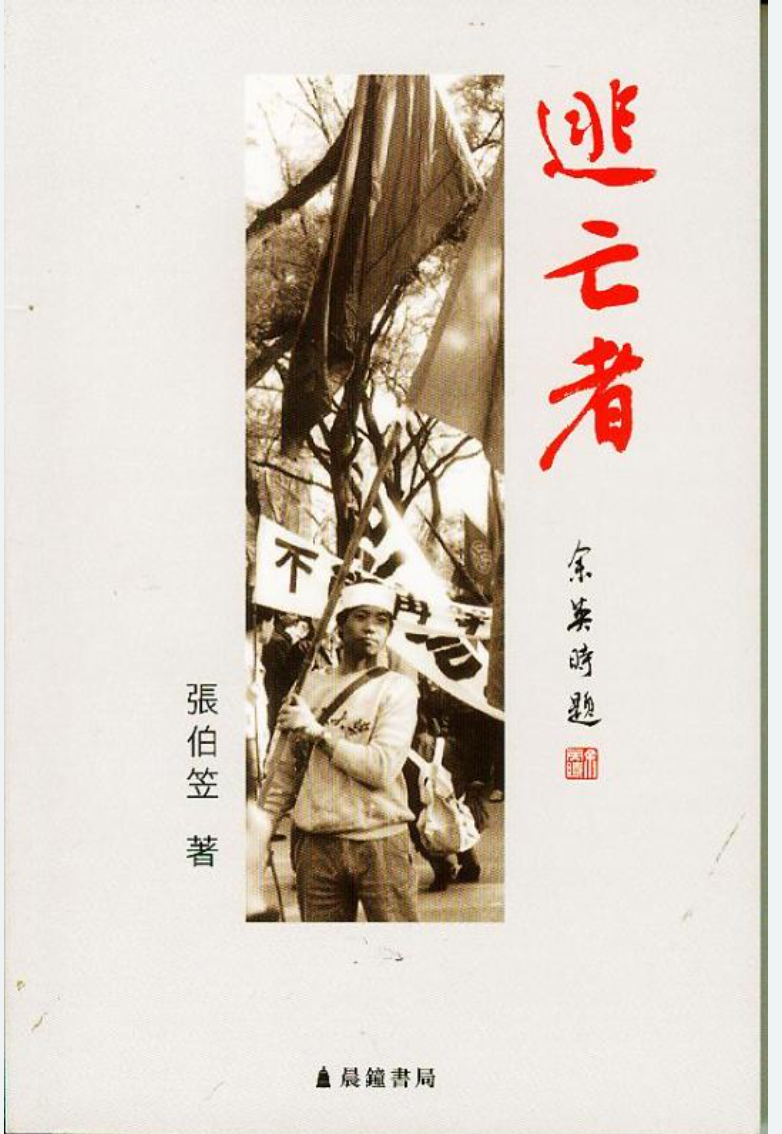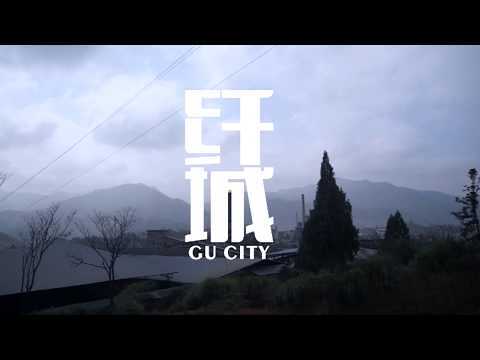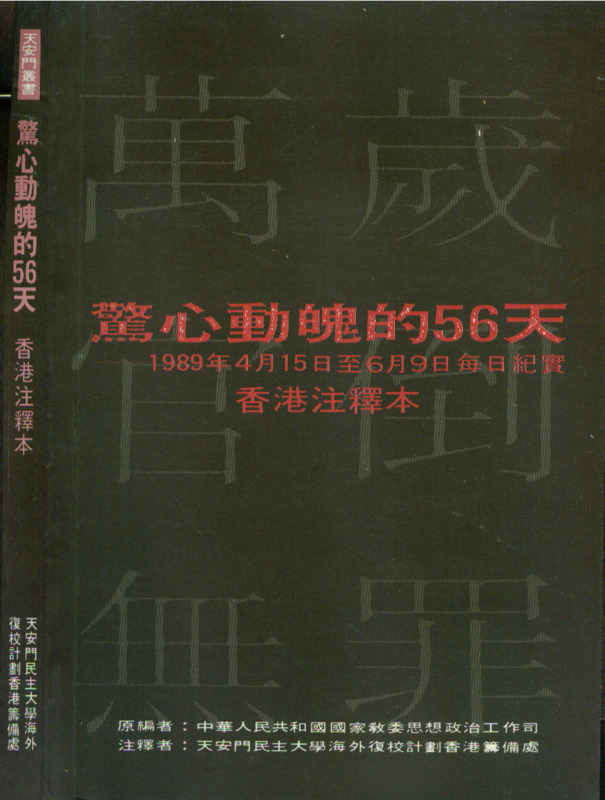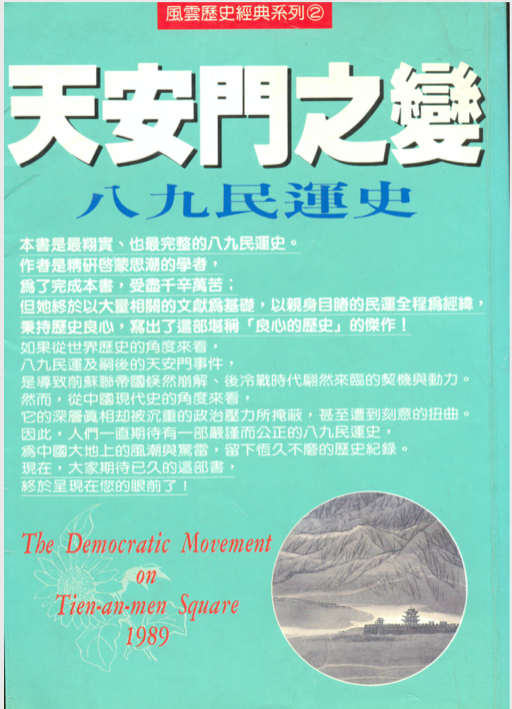Explore the collection
Showing 52 items in the collection
52 items
Book
A Non-governmental White Paper on the June Fourth Massacre
At the turn of the spring and summer of 1989, democratic protests broke out in Beijing and other cities in China. In the early hours of June 4, the Chinese government dispatched troops to suppress the movement. In 2009, on the occasion of the 20th anniversary of the June 4th Incident in 2009, some participants in the movement jointly released the "Unofficial White Paper on the June 4th Incident". The book has 48 pages and a large number of illustrations.
This white paper attempts to provide a complete political background and legal analysis of the events based on reports from Chinese newspapers, radio and television stations at the time, as well as memoirs and interviews that have been published over the past 20 years. Participants in this book believe that the Chinese government has not conducted a comprehensive investigation and objective evaluation of the June 4th Incident, and has long blocked relevant information and prohibited private investigation and discussion of the matter. The report is called a "white paper" to emphasize its rigor and normative nature.
Participants in this book include Hu Ping, Yan Jiaqi, Wang Juntao, Wang Dan, Yang Jianli and others. The book was written by Li Jinjin, a doctor of law.
Book
Anthology of Essays by Zhang Zuhua, An
Zhang Zuhua is an independent scholar in China. In his early years, he served as a member of the Standing Committee of the Central Committee of the Communist Youth League, Secretary of the Youth League Committee of the Central State Organs. Later, he worked at a private research institute, mainly engaged in political modernization, the theory and practice of constitutional democracy, and China's political reform. He was a key participant in China's Charter 08 in 2008. This book is a collection of his political essays.
Book
Blood Letters: The Untold Story of Lin Zhao, A Martyr in Mao's China
This book is the brainchild of Prof. Lian Xi of Duke University, U.S.A. In March 2018, it was published in English by Basic Books in the U.S.A. In 2021, it was published in Chinese by Taiwan Business Press. Based on a large amount of historical materials as well as first-hand interviews, this book reconstructs Lin Zhao's life. It depicts the political development before and after the birth of New China, and presents the resilient will and beliefs of intellectuals in this era.
To purchase this book, please visit [the publisher](https://www.hachettebookgroup.com/titles/lian-xi/blood-letters/9781541644229/?lens=basic-books), or a bookseller.
Book
Bloodshed in Beijing and China: Hong Kong Wen Wei Bao 1989 Special Edition
During the pro-democracy movement in 1989, Hong Kong journalists gathered in Beijing, including Wen Wei Bao"" reporters. This book is a special issue of *Wen Wei Bao* for 1989. It contains a large number of photographs, all taken by its reporters. "After the June 4 massacre, the Communist Party of China (CCP) settled scores with the editorial team of Hong Kong's "Wen Wei Bao," replacing the president, editor-in-chief, and deputy editors-in-chief. The editor-in-chief at the time, Jin Yaoru, later moved to the United States and publicly announced his resignation from the party.
Book
Chronicle of Jiabiangou
Jiabiangou was a labor reform farm in Jiuquan County, Gansu Province, where "rightist" prisoners were held. October 1957, nearly 3,000 educated people were detained there. In October 1961, when the higher-ups corrected the "left-leaning" mistakes of the Gansu Provincial Party Committee and began repatriating the rightist prisoners, less than half had survived.
Writer Yang Xianhui spent five years interviewing more than a hundred people and brought to light the truth that had been sealed for more than forty years. Originally published by Tianjin Ancient Books Publishing House in 2002, this book also includes other short and medium-sized stories by Yang Xianhui.
Book
Chronicle of the 1989 Counter-Revolutionary Rebellion in Beijing
Published in 1989 by the Beijing Daily News, this book is the Chinese government's official account and presentation of the June Fourth Incident. Officially, it describes the June 4 Incident as an upheaval and even stigmatizes it as a counter-revolutionary riot. Some of the accounts presented here need to be judged against other sources.
Film and Video
Chronicle of Western Liaoning, A
In 1959, in the desolate Lingyuan area in the western part of Liaoning Province, a group of intellectual rightists from the Shenyang University arrived. There, they were to labor and be reformed alongside criminal prisoners in the prison, while digging mines to build railroads. How did the Communist Party reform the intellectuals? What kind of encounters did these rightist intellectuals go through? Hu Jie's camera restores this history.
Official Documents
Declassified Files of the Canadian Government on the June Fourth Incident
This document, declassified in January 2015, contains a 1989 diplomatic memorandum from the Canadian Embassy in Beijing. It describes the circumstances surrounding the June 4 massacre as they were known to officials at the Canadian embassy.
The documents, declassified by the National Library and Archives of Canada, show the Canadian government's concern about the invasion of the embassy by Chinese troops. The documents also describe the crackdown in Beijing and how the troops killed citizens.
Book
Democracy Curriculum
Written by Chinese liberal intellectual Liu Junning, this book circulated underground in 2006. The book parses the fundamentals of democracy as well as historical experience. It was quickly banned in China.
Film and Video
Enemy of the State
On February 9, 2010, Tan Zuoren was tried in the Chengdu Intermediate People’s Court for the crime of inciting subversion against the state. Ai Xiaoming and her team recorded the three days before and after the verdict, the mindsets of Tan Zuoren’s friends and relatives, and how the lawyers carried out their work.
This film is in Chinese with Chinese subtitles.
Book
Escape From China: The Long Journey from Tiananmen to Freedom
Author Zhang Boli, a former student leader of the June 4 Democracy Movement, was ranked 17th on the "21 Most Wanted List." After June 4, Zhang Boli went into hiding in his hometown in Northeast China and crossed the border into the Soviet Union, where he was detained and repatriated by the Soviets. The Soviets did not hand him over to the Chinese border guards, but let him leave on his own. In the two years following June 4, Zhang Boli was the only June 4 pro-democracy leader who was neither captured by the Chinese Communist Party nor able to flee China. It was not until 1991 that Zhang Boli arrived in Hong Kong through secret channels and applied for political asylum at the U.S. Consulate. *Escape From China:The Long Journey from Tiananmen to Freedom* was published and translated into many languages. The English version won the Washington Post's "Best Book Award".
Film and Video
Faraway Mountain
This movie captures the lives of miners in small coal mines in the Qilian Mountain area of Qinghai Province. At 3600 meters above sea level, the air here is thin. Miners in the small coal kilns labor hard in a working environment without any protection, and usually get silicosis after 5-10 years of work, thus losing their ability to work. If they die in an accident, their families receive only meager compensation. This is a true record of the survival of China's grassroots laborers in the early 1990s.
Film and Video
Fiber City
Fiber City—the collective name Fujian Textile and Chemical Fiber Factory—was founded in 1971. China's first production in the 1970s, one of the nine Vinylon factories located in Yongan City, Fujian Province, deep in the mountains, 3 kilometers outside the outskirts of the industrial town. Once glorious, it has been gradually lowering its curtains. The old factory buildings are mottled, its young workers are now gray-haired, and many have left. The documentary shows the fate of this big factory during the planned economy.
Book
Fracture—Chinese society since the 1990s
This monograph by Sun Liping, a professor at Tsinghua University, was published by China Literature Publishing House in 2003. The author systematically analyzes a series of changes in Chinese social life since the 1990s. The book discusses the meaning and characteristics of fractured society; the formation and background of fractured society; widening income gaps and the formation of vulnerable groups; the new urban-rural dual structure; trust crisis and social order; social conflicts and institutional innovation, etc.
Book
Great Power Sinking: A Memo to China, A
This book is a collection of political essays by Nobel Peace Prize winner Liu Xiaobo. It is a sister volume to *Single-Edged Poisoned Sword - A Critique of Contemporary Nationalism in China*, which covers many aspects of Chinese politics, including: one-party dictatorship, powerful capitalism, rights defense, June Fourth, and nationalism.
Book
History of the 1989 Democracy Movement
This 10-volume book of 1.3 million words was written by Chen Xiaoya, a former associate researcher at the Institute of Political Science of the Chinese Academy of Social Sciences. The first edition was written in April 1994 and published in Taiwan in 1996, but with just over 200,000 words. Later, Chen Xiaoya revised the book several times to increase its content: starting from 1976, the year of Mao Zedong's death, and covering Hu Yaobang's political career as well as the background of the June Fourth Incident and also adding the contents of the memoirs of the parties involved in the June Fourth Incident. The number of words was increased to 1,360,000 words in 2016 when the book was published. The book was reprinted in 2019.
Purchase link:https://www.amazon.com/%E3%80%8A%E5%85%AB%E4%B9%9D%E6%B0%91%E9%81%8B%E5%8F%B2%E3%80%8B%E3%80%8A%E5%85%AB%E4%B9%9D%E6%B0%91%E8%BF%90%E5%8F%B2%E3%80%8B-%E7%AC%AC%E5%85%AB%E5%8D%B7-DEMOCRACY-MOVEMENT-Traditional-ebook/dp/B07VN848V8
Book
Holy Virgin on the Altar - A Biography of Lin Zhao, The
This book is a biography of Lin Zhao written by mainland writer Zhao Rui and published by Taiwan's Xiuwei Information Publishing House in 2008. The book describes Lin Zhao's life and family background in detail. The "Appendix" contains the recollections of several people involved.Purchase link: https://www.books.com.tw/products/0010431680.
电影及视频
In Search of Lin Zhao's Soul
Hu Jie narrates the life of Lin Zhao, a Christian dissident who was condemned as a Rightist in the late 1950s and executed during the Cultural Revolution. Prior to becoming a mentcritic of the government, Lin Zhao was an ardent believer of communism. She demonstrated talent in writing and speaking as a star student in Peking University. However, after criticizing the government in 1957 during the Hundred Flowers Campaign, she was cast as anti-revolutionary. Despite the government’s attempts to silence her, Lin Zhao continued to speak and write publicly, including contributing two epic poems to Spark, an underground student-run journal. In 1960, she was arrested, and despite being released briefly in 1962, spent the rest of her life behind bars, under extremely poor living conditions. Nevertheless, she continued to write in prison, sometimes with her blood. In 1968, at the age of 36, she was executed by a firing squad.
In this documentary, Hu Jie showcases many of Lin Zhao’s surviving writings and poetry. These pieces often contain criticisms of the communist regime, as well as commentary on policy issues pertaining to labor and land reform. In making this film, Hu Jie traveled around China to interview friends and associates of Lin Zhao, who knew her as a student, activist, or prisoner. This documentary includes excerpts from interviews with them, which inform us about Lin Zhao’s personality and motivations.
This documentary has contributed to a widespread revival of interest in Lin Zhao, who had almost become a forgotten figure until the film’s appearance.
Book
Inside the bloody clearing of Tiananmen Square
This book is a complete record of the entire process of the forceful clearing of Tiananmen Square in 1989, which began at noon on June 3, 1989, and ended at 10:00 a.m. on June 4th. The author, Wu Renhua, who experienced the June Fourth Incident, describes some of the important events and characters in the book. For example, how Liu Xiaobo, Hou Dejian and other "Four Gentlemen" contacted and negotiated with the PLA martial law forces; how the tanks of the six departments chased and crushed the evacuating students; and how the medical staff put their own lives at risk to save the wounded in the rain of bullets and bullets. The first draft of this book was completed in May 1990, according to Wu Renhua's own account. He fled the mainland in 1992. In May 2007, he published *Inside the Bloody Clearance of Tiananmen Square* in Los Angeles. This was his first monograph on June Fourth. The book has since been updated and reprinted several times.

